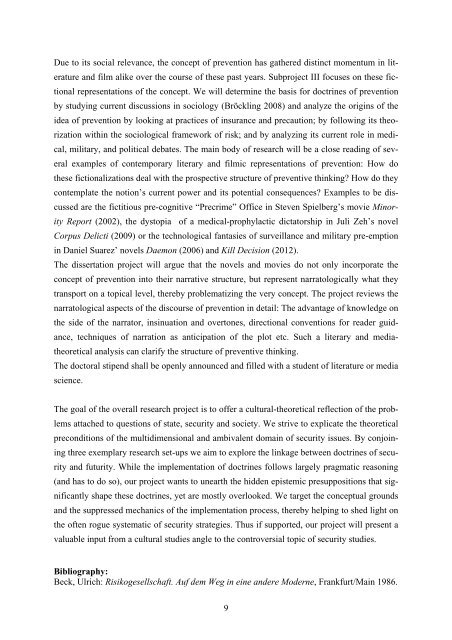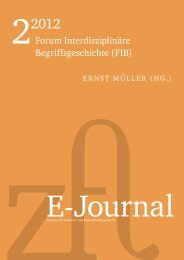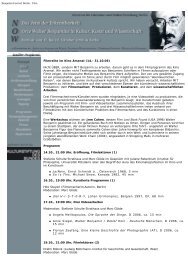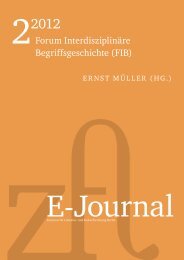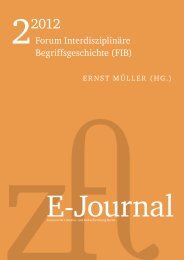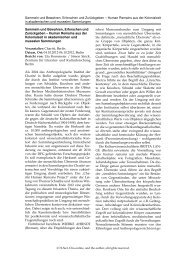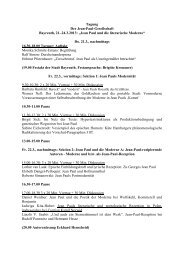Das Zentrum für Literatur- und Kulturforschung Berlin (ZfL) vergibt ...
Das Zentrum für Literatur- und Kulturforschung Berlin (ZfL) vergibt ...
Das Zentrum für Literatur- und Kulturforschung Berlin (ZfL) vergibt ...
Create successful ePaper yourself
Turn your PDF publications into a flip-book with our unique Google optimized e-Paper software.
Due to its social relevance, the concept of prevention has gathered distinct momentum in literature<br />
and film alike over the course of these past years. Subproject III focuses on these fictional<br />
representations of the concept. We will determine the basis for doctrines of prevention<br />
by studying current discussions in sociology (Bröckling 2008) and analyze the origins of the<br />
idea of prevention by looking at practices of insurance and precaution; by following its theorization<br />
within the sociological framework of risk; and by analyzing its current role in medical,<br />
military, and political debates. The main body of research will be a close reading of several<br />
examples of contemporary literary and filmic representations of prevention: How do<br />
these fictionalizations deal with the prospective structure of preventive thinking? How do they<br />
contemplate the notion’s current power and its potential consequences? Examples to be discussed<br />
are the fictitious pre-cognitive “Precrime” Office in Steven Spielberg’s movie Minority<br />
Report (2002), the dystopia of a medical-prophylactic dictatorship in Juli Zeh’s novel<br />
Corpus Delicti (2009) or the technological fantasies of surveillance and military pre-emption<br />
in Daniel Suarez’ novels Daemon (2006) and Kill Decision (2012).<br />
The dissertation project will argue that the novels and movies do not only incorporate the<br />
concept of prevention into their narrative structure, but represent narratologically what they<br />
transport on a topical level, thereby problematizing the very concept. The project reviews the<br />
narratological aspects of the discourse of prevention in detail: The advantage of knowledge on<br />
the side of the narrator, insinuation and overtones, directional conventions for reader guidance,<br />
techniques of narration as anticipation of the plot etc. Such a literary and mediatheoretical<br />
analysis can clarify the structure of preventive thinking.<br />
The doctoral stipend shall be openly announced and filled with a student of literature or media<br />
science.<br />
The goal of the overall research project is to offer a cultural-theoretical reflection of the problems<br />
attached to questions of state, security and society. We strive to explicate the theoretical<br />
preconditions of the multidimensional and ambivalent domain of security issues. By conjoining<br />
three exemplary research set-ups we aim to explore the linkage between doctrines of security<br />
and futurity. While the implementation of doctrines follows largely pragmatic reasoning<br />
(and has to do so), our project wants to unearth the hidden epistemic presuppositions that significantly<br />
shape these doctrines, yet are mostly overlooked. We target the conceptual gro<strong>und</strong>s<br />
and the suppressed mechanics of the implementation process, thereby helping to shed light on<br />
the often rogue systematic of security strategies. Thus if supported, our project will present a<br />
valuable input from a cultural studies angle to the controversial topic of security studies.<br />
Bibliography:<br />
Beck, Ulrich: Risikogesellschaft. Auf dem Weg in eine andere Moderne, Frankfurt/Main 1986.<br />
9


